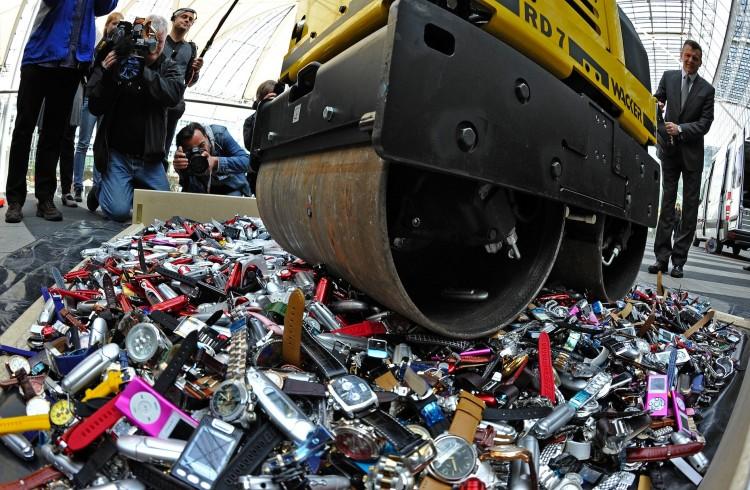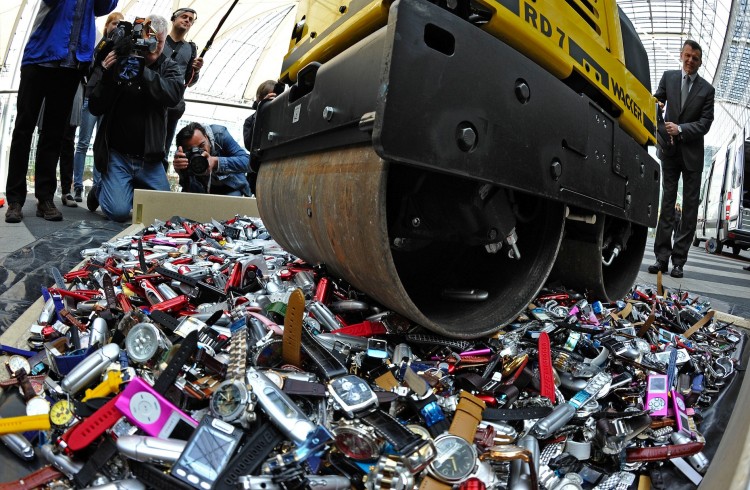It’s a constant game of cat and mouse between counterfeiters and law enforcement authorities.
As counterfeiters have moved beyond knock-off Rolexes and fake Louis Vuitton handbags to more ambitious, and dangerous, goods such as medicine, electronics, and food products; the stakes in terms of harm to human health and the global economy have increased.
The Washington-based International Anticounterfeiting Coalition estimates that counterfeiting costs the globally economy $600 billion a year.
The latest statistics by the European Commission show a continuous upward trend in the number of shipments suspected of violating intellectual property rights. In 2011, customs detained goods more than 91,000 times—an increase of 15 percent compared to 2010.
“Although customs authorities have got better at stopping them, the international trade of fake goods is a growing problem for our societies,” said Jürgen Creutzmann, member of European Parliament (MEP) via email.
One major development that’s helped the underground economy is the growth of e-commerce, or small consignments sold online and shipped via private and public post. This type of trade rose 200 percent last year in the EU alone.
The World Customs Organization estimates that between 5 and 7 percent of all traded goods worldwide are fakes.
This triggered European authorities to take decisive action to counteract the trend last July.
Creutzmann, a member of the European Parliament Committee for Internal Market and Consumer Protection, proposed a new simplified procedure for customs enforcement to facilitate intercepting of dangerous consumer products such as fake drugs ordered online.
According to the new resolution, for any goods flagged by customs as suspect, the receiver would have just five days to prove the good are real, or the products will be destroyed.
“In practice, it means that customs would be able to take action against goods found to be infringing intellectual property rights rules. The existing procedure for the anticipated destruction of such goods would also be made mandatory in all member states for counterfeit and pirated goods, which is currently not the case,” Emer Traynor, spokeswoman of the European Commission for Taxation, Customs, Anti-Fraud, and Audit, wrote in an email.
In the United States, the number of intellectual property rights seizures increased by 24 percent in 2011 compared to the year prior. The value of the seizures amounted to $188.1 million.
China continues to be the number one source country of counterfeit and pirated goods seized, accounting for 62 percent of seizures.
Danger to Consumers
Apart from infringing on the rights of producers and depriving them of due profits, counterfeit products are dangerous and misleading to consumers.
According to the EU Customs Office, last year, products intended for personal care products accounted for 28.6 percent of all confiscated goods, compared to 14.5 percent in 2010—the vast majority (24 percent) were fake medicines.
Dr. Jeff Poston, executive director of the Canadian Pharmacists Association, cites the Internet as a major problem. “It’s estimated that about 50 percent of drug products that are available over the Internet are counterfeit,” says Poston.
That number could be as high as 80 percent for lifestyle enhancement drugs such as Viagra, he adds.
In the United States, the Counterfeit Pharmaceutical Inter-Agency Working Group reported in 2011, that fake anti-anxiety drugs sold on the Internet contained pentobarbital—a drug typically used for sedation before administering lethal injections.
In another case, a mock version of an American company’s vaccine for pneumococcal bacteria distributed in El Salvador, was found to be missing the essential ingredient—providing families with a false sense of disease protection. Similarly, counterfeits of two cancer drugs trademarked by a U.S. company and illegally manufactured in China and Indonesia were devoid of the critical active ingredient.
The U.K. Intellectual Property Crime Group has warned of potentially lethal counterfeit consoles and other electrical goods flooding the market. The group found faulty wiring on bogus Nintendo Wiis that could electrocute a child, and said fake iPhones, laptops, and Nintendo DSi handhelds were at risk of overheating.
In another U.K. case, the office for trading standards in Powys County successfully prosecuted two people for selling counterfeit makeup over the Internet. The pair made over $3,000 per month selling the counterfeit makeup that was found to contain 20 times safe levels of lead.
In 2006, a 57-year-old Canadian woman died from counterfeit medicine purchased online that contained uranium and lead.
In order to beat counterfeiters, along with strengthening law enforcement mechanisms, consumers also need to be better educated. For one thing, most consumers aren’t aware of the extent of fake goods produced nowadays.
“Counterfeiting is often thought of as only being a problem in the apparel and luxury goods sectors. In reality however, nearly every product sector is now affected to some degree,” wrote Travis Johnson, vice president of the International AntiCounterfeiting Coalition.
“So it is important to get that message to consumers, so that they can take reasonable precautions to protect themselves.”
Chris Gray, director of the Canadian Intellectual Property Council agrees. He says the best defense against dangerous counterfeit is awareness.
“If you’re buying eight batteries for $2 at the dollar store, and they say Duracell on them, I think your common sense has to kick in.”
With reporting by Patrick Li in Toronto.
The Epoch Times publishes in 35 countries and in 19 languages. Subscribe to our e-newsletter.







